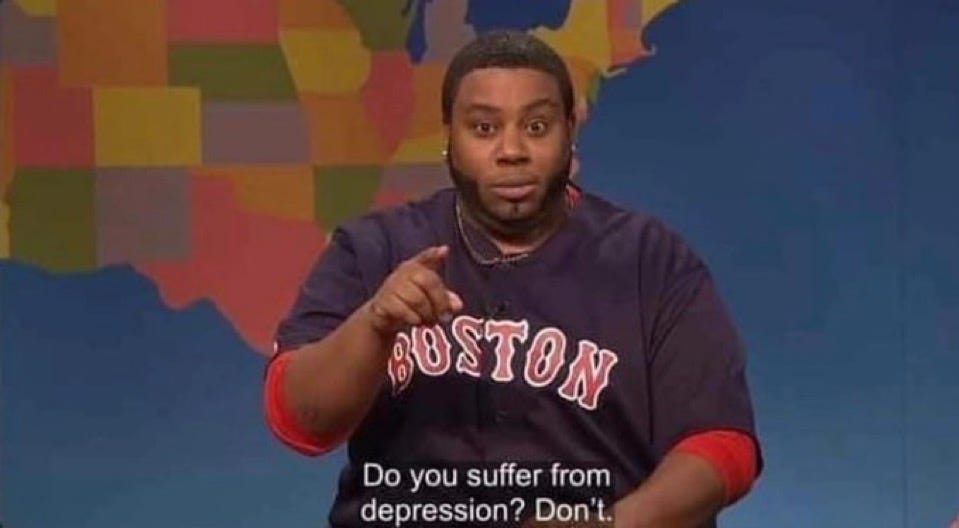Bottom’s Up is a weekly publication looking at the upside-down nature of the Kingdom of God and the ways of Jesus. How can we live in the midst of the kingdoms of this world while being faithful to the ways of Jesus? I’m trying to figure it out and would love for you to join me
If this interests you, please subscribe! If you already have, feel free to share it with someone
As many of you know, I’m currently taking classes towards my Master’s in Clinical Mental Health Counseling. I’ve completed two of those classes and am in the midst of my third, so I guess you could say I’m an expert1. Over the last month, two different videos found there way across my algorithms and I figured I’d share a few thoughts and point you toward even better ones.
First we had our good, old buddy John MacArthur. Speaking at a church conference back on April 20th, MacArthur said “There’s no such thing as PTSD. There’s no such thing as OCD. There’s no such thing as ADHD. Those are noble lies to basically give the excuse, in the end of the day, to medicate people. And Big Pharma is in charge of a lot of that.” He goes on to tell parents that their kids behavior is a matter of choices and with good parenting you’ll get kids who make good choices. You can watch an extended clip below:
Alan Noble, author of On Getting Out of Bed: The Burden and Gift of Living2, responded to these comments on his own Substack and I would recommend you check out his thoughts. Here are a few of my own thoughts as I have had time to think about and hear the thoughts of others over the last month:
It seems significant to point out that this clip started making the rounds on the social media platform formally known as Twitter because it was shared by those who agree and support MacArthur. There are plenty of “gotcha” accounts that follow conservative evangelicals and/or right-wing political talking heads to repost their craziest takes to make them look bad to the people who already think they look bad. That’s not what this was. MacArthur is far from alone.3
This is the prosperity gospel. Certainly J-Mac and his followers would be quick to critique the prosperity gospel and dismiss the preachers of it. However, when you are “trying to make clear to parents that behavior is essentially the result of choices…and if you parent them properly, they’ll make right choices” you are preaching a form of the prosperity gospel.
To call PTSD, OCD, and ADHD “noble lies” is an extreme, obvious form of what exists in so many forms parts of American Evangelicalism. I have a hoodie that says “Jesus & Therapy” on it. Most people don’t comment on it at all, the second largest group say some form of “I love it,” and one person said “Jesus is my therapy.” This is spiritual bypassing. Spiritual bypass is defined as spiritual ideas or practices to sidestep unresolved emotional issues, psychological problems, or incomplete developmental tasks. Studies have show that it can lead to heightened levels of depression, anxiety, and a lack of self-awareness and empathy.
No one who should be taken seriously would tell you to simply pray away your bad breath, broken bone, or high blood pressure. So we shouldn’t take anyone seriously who gives similar advice for mental suffering.
Christian Integration in Mental Health Counseling
The class I am currently taking is called Integration of Spirituality and Counseling. There has a been a concentrated focus on multicultural awareness in counseling for the last decade +. Essentially, it is important for counselors to recognize that to help a client achieve mental wellbeing, they need to know how a clients cultural background will effect them. White Americans will more likely have an individualist mindset than will a Syrian refugee, for instance. Pretty straightforward in its approach and easy to understand, but certainly challenges to application in the actual counselor/client relationship.
More recently this look at the need for multicultural awareness has spread to spirituality/religion. One’s religious convictions should be taken into account in the counseling relationship - both the counselor and the client. I’m coming to see spiritual integration as a form of truth-telling. It would be intellectually dishonest for me, the hypothetical counselor, to not acknowledge that I have been formed and shaped by my Christian faith. Acknowledgment is the first step, but there are many more steps in making sure my integration remains ethical and I’m not imposing any of my beliefs or values on any clients. It would also be my job to work with a client to help them gain awareness of how and spiritual/religious traditions have helped form and shape them, allowing them to be honest with themselves.
When there are prominent pastors sharing advice like that of John MacArthur’s above, it strikes me as abundantly important that there is a counter voice that advocates for Christian Integration in healthy responsible ways that acknowledge the realities of psychological science while allowing for the Christian tradition to be a part, not the sum, of counseling and the pursuit of mental well-being.
I am not an expert.
I believe he recently doubled-down, maybe explained, his thoughts further when he joined America’s bravest Culture Warrioress, Allie Beth Stuckey. I can’t bring myself to watch/listen to it, so I can’t be sure.




